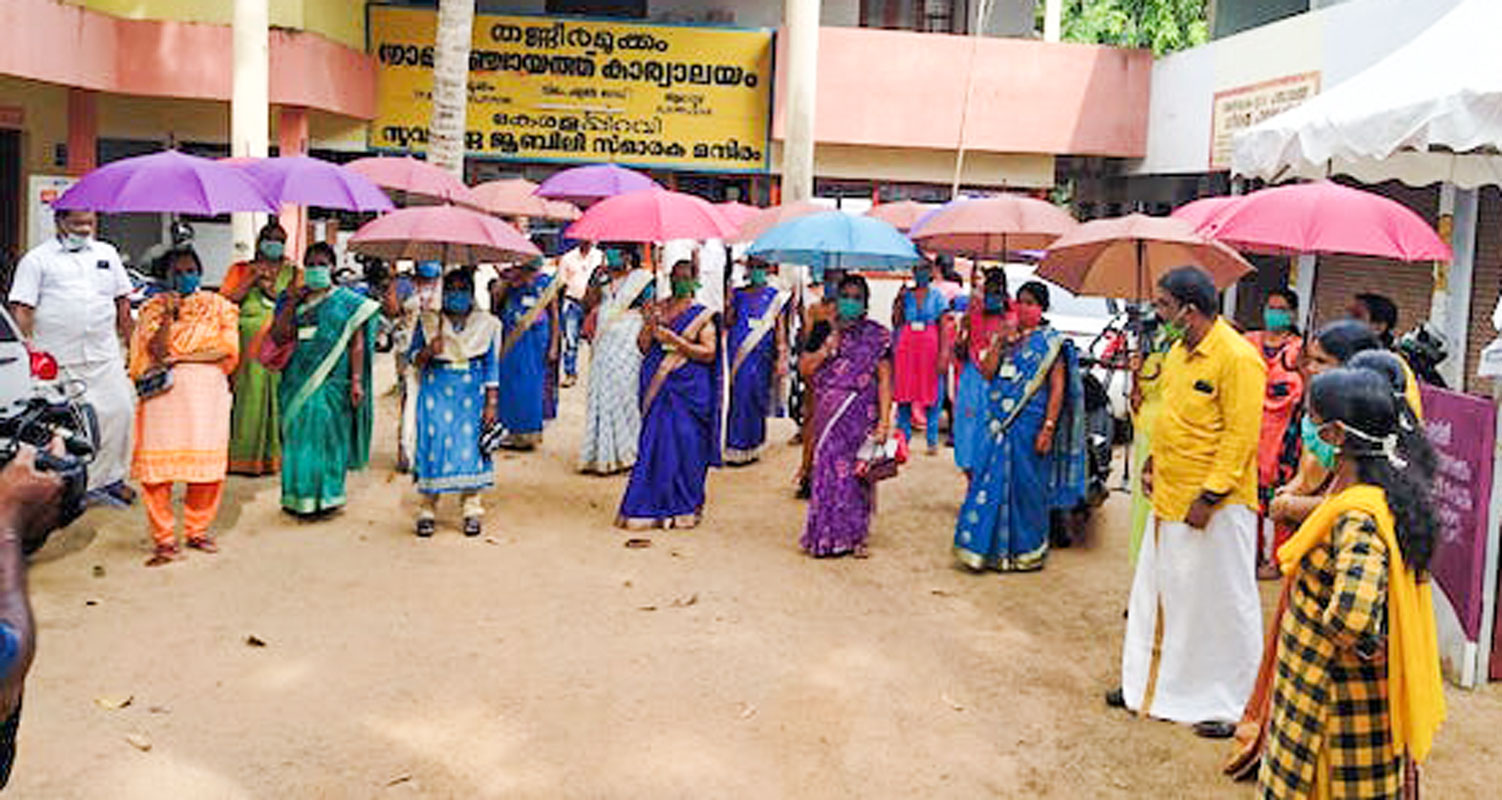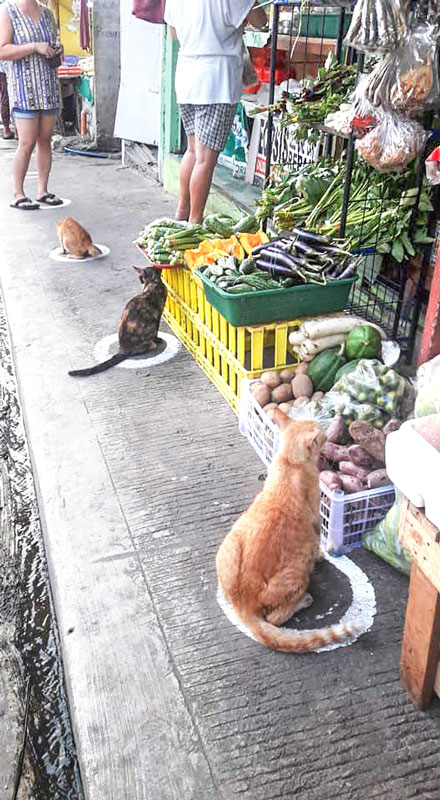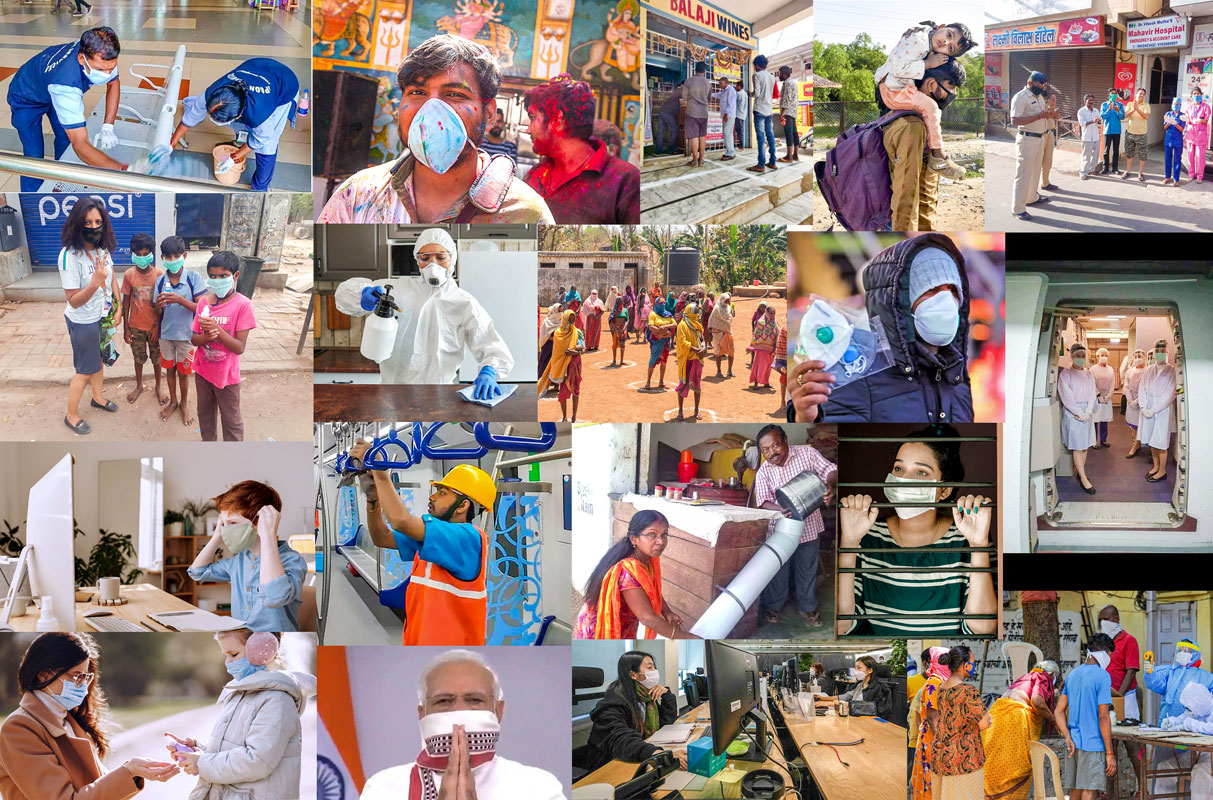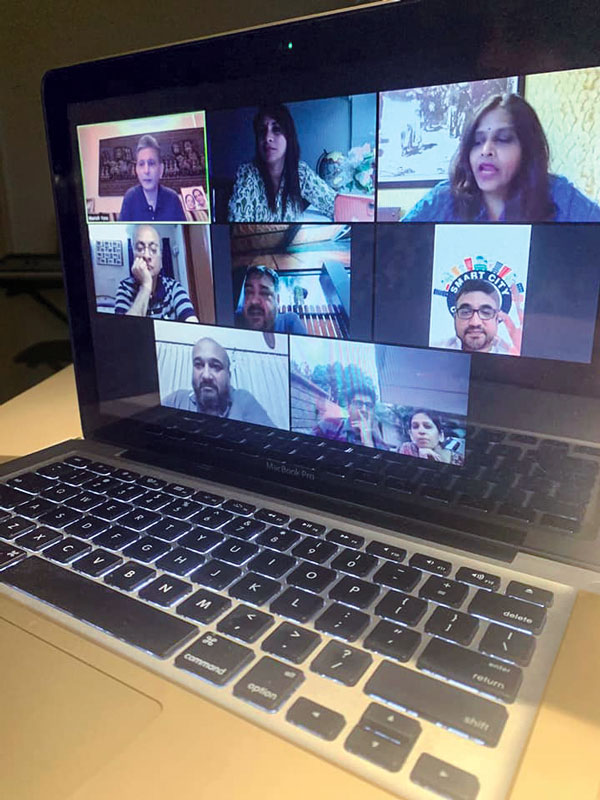The post-Covid world
The entire world, without any exception, is grappling with the human, health and economic fallout of the corona pandemic which is bringing back memories of the most horrific movies depicting the destruction of mankind by some virus, dinosaur, and other beings that human imagination can ever conjure. And the uppermost question in our minds is what life is going to be after a vaccine is finally found and we pick up the threads of our disrupted lives.
One thing is certain; the economic fallout of this pandemic globally, and also for India, is going to be terrible. But before we can even think of the economic fallout… the losses that our industries and businesses are going to be making and the lakhs of people who are going to lose their jobs, and the untold human misery brought to lakhs and lakhs of our migrant workers, will continue to haunt us for decades. And there are so many images to shake the very foundation of our being…
As consumer spending plummets and economy moves into recession, grocery shopping will go up. You don’t want to run out of onions, tomatoes or green chillies in your kitchen.
After all who will forget the image of the little child trying to wake up his dead mother, who had collapsed on the railway platform after travelling from Gujarat to Bihar without food and water? Or the sleepy child being dragged by the mother on a suitcase? Or the images of miles and miles of long queues of migrant workers undertaking long and arduous journey back home to their villages on foot, often hungry and thirsty and totally at the mercy of both ordinary and privileged human beings with a heart to give them some food and water.
When asked why they were undertaking this dangerous journey as many collapsed and died under the scorching April/May heat, the one refrain that hit you in the gut was: “Our villages will be able to find the food to feed us. If not, we will starve to death, but at least there will be someone to cry for us.”
It was heartening to see Shah Rukh Khan’s Meer Foundation coming forward to take care of the child who lost his mother at the Railway station.

The manner in which Rotary clubs and Rotarians across India came forward to give food and water to the migrants is most commendable but their sorry plight is a blot on our collective conscience… how did we fail those who have worked relentlessly to build our homes, brick by brick, fix our doors, paint our walls, and beautify them with intricate and elegant woodwork. How could we as a nation fail to ensure that just before the lockdown started, they were not given special trains, buses, trucks etc to help them reach home?
So what does a post-Covid pandemic world look like and what will the new normal be in the coming months? We will have to adapt to all kinds of behavioural changes in the months to come, whether it is how we work, network, shop, eat or travel.
Shopping habits
First of all, our shopping habits will change dramatically. Traditionally these change very slowly, and the way we buy food, clothes, accessories, all undergo a big change only if we shift cities or have a big event coming up… such as the arrival of a child or grandchild.
Also, we have to remember that with economists and almost all Central banks forecasting recession and negative growth of the GDP, consumer spending will fall drastically. But with our fear of shortages, one area where consumers are not pinching their pennies is of course grocery shopping. You don’t want to run out of onions, tomatoes or green chillies in your kitchen after all. And then there is bread, rice, milk, eggs, other vegetables, garbage bin liners, paper napkins and the whole paraphernalia that keeps any kitchen going.

So while garments, footwear and jewellery stores remained closed and saw little demand online even when online delivery was allowed in some areas, the average spend on grocery went up. One study in the US found that during one week in March, grocery store sales spiked 77 per cent over the previous year, as panic buying began (remember how toilet paper rolls ran out?) while restaurant sales declined by 66 per cent! In late April, grocery sales were still running 8 per cent above average, while restaurants were down 48 per cent.
Working from home
The threat of this infection will continue to loom, and as we have been warned by health researchers, new viruses after Covid-19, might hit the globe once every two years. And as two months of continuing lockdown and challenges to reach offices across the world, thanks to threat of infection, has shown, companies have found that their employees can indeed work from home. Google has said a majority of its employees can work from home until 2021. Twitter CEO Jack Dorsey says his employees will be allowed to work from home permanently, even after Covid.
According to the US Census, about five per cent American workers primarily worked from home in 2017, up from over three per cent in 2000, said an article in the Harvard Business Review, adding that by 2018, 29 per cent of workers in the US had the option and ability to work at home.
And now employers have found that during several weeks of lockdown, when threat of infection loomed, compelling them to keep their offices closed, productivity continued to be robust through online work done from home. Of course it is much easier in some industries… say IT compared to manufacturing… to work from home. But even then, IT major Microsoft CEO Satya Nadella has already raised a red flag over the ills of working from home, which would be “replacing one dogma with another” and said it can be damaging for social interaction and mental health of workers.
Microsoft CEO Satya Nadella has already raised a red flag over the ills of working from home, saying this would be “replacing one dogma with another”.
In an interview to the New York Times he said that virtual video calls cannot replace in-person meetings. “What I miss is when you walk into a physical meeting, you are talking to the person that is next to you, you’re able to connect with them for the two minutes before and after. What does burnout look like? What does mental health look like? What does that connectivity and the community building look like? One of the things I feel is, hey, maybe we are burning some of the social capital we built up in this phase where we are all working remote.”
Cooking at home versus eating out
Another major change this pandemic has brought about is in our eating habits… we now eat more at home, both by compulsion and choice and are likely to continue to do so. So in the days and months to come, we are going to cook more at home or depend on takeaways or online ordering of food. Right now, most people are so paranoid about getting infected by either the restaurant food itself or the delivery boy who brings it, I know several homes in India are not even touching outside food.
And with several apartment complexes, especially their residents’ associations, not permitting domestic workers to report to work for fear that they may bring Covid into the complex, the burden of cooking, cleaning and washing on the women has increased severalfold.

My niece in Gurgaon, who lives in a posh apartment complex, describes the paranoia in their complex which is at a crazy high! Forget allowing domestic help, even delivery boys were not allowed during the lockdown. With perennially hungry and bored kids demanding some kind of sustenance or the other all the time, “I seem to be coming out of the kitchen only to re-enter it within 15 minutes,” she said. In desperation she started ordering food online, but had to walk 700 metres to the main gate under the scorching sun to collect the food, and while returning to her block “got sprayed with disinfectants. Our RWA really went berserk with safety norms,” she said in exasperation.
So what else is going to change? Lots of course…. the uncomfortable mask has come to stay for some time and online stores such as Myntra, desperate for customers, are now offering stylish and colourful sets of masks for women! Offices, when they start functioning, will have sanitisers and other disinfectants in plenty, the fingerprint sign-in will be replaced by face recognition devices, and cubicles will have protective partitioning.
Think of the benefits… “knowledge workers” as they are called, will no longer have to stay close to their offices which are mainly in prime real estate space, paying huge rents… they can move out to the outskirts of crowded cities… and maybe programme their work schedule in such a way that they would be able to pick up their kids from school, and even join the family for dinner every single day!
But the problem appears to come mainly from bosses, who, as an article in The New Yorker points out, need to boss. The main obstacle to the success of the work-from-home formula will be “the reluctance of bosses. Managers are often seen as standing in the way of working from home. A corner office isn’t as impressive over Zoom, and, conversely, it’s easier for a boss to keep track of employees when she can see them at their desks or in the hall.”
But as the warm hugs and firm handshakes disappear from our world, they will take away something with them… the warmth of the human touch… physical, psycological, emotional…
Two leaders speak of post-Covid world & Rotary

While talking of The Rotary Foundation’s super quick response to grant applications from Rotarians for corona-related relief work (elsewhere in this issue), I quizzed incoming Trustee Chair K R Ravindran, a leading industrialist from Sri Lanka, about the impact on commerce and industry.
He says much of the business world’s initial response to the virus was “firefighting. Nobody had experienced anything like this before. But then fashion firms like H&M, the Luis Vuitton group, etc, retooled production to make masks and hand sanitisers. Makers of cars like General Motors, Ford, Puegeot, Volvo and others switched from producing vehicles to ventilators. The immediate future looks challenging for them with motor vehicles sales forecasted to drop by 25 per cent.”
Any economy is driven by demand or consumption. “When households worry more about their health and finance, they are likely to focus on saving not spending. This will reflect on business and commerce. On April 20, oil became less than worthless. The American benchmark plummeted to $40 a barrel. Can you imagine? The oil producers had to pay someone for taking the oil they produced!”
Disneyland reopened a portion of its Shanghai Disney Resort as China’s pandemic began to ebb. “But a trip to Disneyland may never be the same again. Guests must wear masks at all times, removing them only for eating. The number of hours and capacity are limited.
And just to gain entry, visitors must submit to a temperature check and present a government-controlled QR code on their phone that indicates they are virus-free,” he said.
A hardcore sports enthusiast, Ravindran added that the world of sports will never be the same again. “Germany’s Bundesliga (its football league, which has the highest average stadium attendance worldwide) became the world’s first major sports competition to emerge from the coronavirus lockdown. Players are being tested twice a week, coaches will have to wear face masks and fans will be banned from stadiums.
The League is now contemplating only 300 spectators in a stadium and players essentially sequestered for weeks at a time. But they have no choice. The Bundesliga is a Euro 4 billion ($4.3 billion) business that has come to a grinding halt. “Clubs have lost tens of millions of euros and viewers are quitting the local pay-TV sport networks. Teams are running out of money and player values have fallen off a cliff. So the prospects for the days ahead are certainly not attractive,” he adds.
I next asked RI Director Bharat Pandya that while Indian Rotarians had taken to Zoom and online meetings on other platforms like fish to water, wouldn’t something die in an organisation that thrived on physical meetings, camaraderie and fellowship.
He admitted that one of the “prime attractions, the binding force, of Rotary has been Fellowship. The warmth and welcoming atmosphere generated by good fellowship at Rotary meetings and other events has been a major attraction and reason for Rotary being relevant and effective.”
But in the post-Covid world, “where the way we interact, travel or meet, are all going to change, the question is how do we ensure the continuing relevance of Rotary. One way we will remain socially connected is through virtual meetings. While there are both pros and cons of virtual meetings, there is no doubt that physical distancing is here to stay. I have always said that you cannot email a hug or fax a handshake. So no in-person meetings will result in loss of personal touch. It is difficult to banter over Zoom but we must keep the bonds of fellowship strong.”
Pandya draws upon what Rotary founder Paul Harris had said about “being evolutionary at all times and revolutionary on occasions. This is the time to be revolutionary — think differently, out-of-the box. It cannot be business as usual. I see meetings in small groups happening in a couple of months, with all precautions —
thermal scanning, distancing, personal protection. But the onus is on Rotary leaders at the club, district and international levels to make that extra effort to keep connected with Rotarians, and keep them engaged.”
He urged club and district leaders to pick up the phone and talk to their members regularly, while having meetings in different formats — small groups, at home, hybrid and virtual meetings, to discuss different ways of doing service projects, avoiding large gatherings.
“These are ideas whose time has come. The camaraderie and fellowship of Rotary has given us all dhal mitras or true friends, who will stand with and by you during times of happiness and sorrow, in joy and in crisis, and I have no doubt that Rotary will emerge stronger from this pandemic.”
Pandya puts his finger on the essence of friendship and connectivity when he adds: “If I want a friend, first I have to be a friend. That sums up the joyous responsibility each Rotarian has to make that extra effort, walk that extra mile, to ensure that this binding glue of Rotary becomes a strong bond that endures. Rotary friendship is like diamonds — bright, beautiful, valuable and always in style. Let’s change the trend and be a friend. That will be our gift to the Rotary world.”


